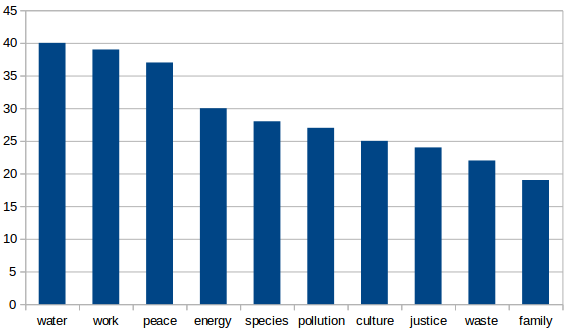A cursory analysis of the Encyclical Letter Laudato Si’ of the Holy Father Francis on Care for Our Common Home provides some interesting insight on the priorities of this important document:

The ranking is based on an automated word count script, coded in Perl. The numbers in the Y axis of the chart indicates the number of occurrences of each word.
Please note that this ranking is not to be intended as a “Top 10″…many other terms are considered in the spreadsheet used for the full analyisis (see below for the download). To make a long story short on a first round of analysis, I decided to list in this post the first ten terms, without implying that the bottom items are of least importance.
The analysis is necessarily simplified (hence the reference to a version 1.0 for this blog post). For example:
- singular and plural occurences of nouns are not assimilated
- a few encoding issues have been observed in the source file for the analysis (these do not impact the readability of the source document, but will affect the automated word count in the basic form used)
- context is ignored (e.g. “water is good for drinking” or “water generates floods” will provide a word count of 1 for water, anyway)
Furthermore, I have applied my personal judgment in highlighting nouns and other terms in the document (e.g. certain adjectives).
The file used for this analysis may be donwloaded at pibinko.org.
It is likely that applying better tools for natural language processing or text mining, more significant results will be obtained. Nevertheless, the basic analysis presented here are interesting enough (and fairly reliable, having run simple QA/QC tests on selected terms).
Being active in the topic of artificial light at night, I also noted sub-section 211:
II. EDUCATING FOR THE COVENANT BETWEEN HUMANITY AND THE ENVIRONMENT
211. Yet this education, aimed at creating an “ecological citizenship”, is at times limited to providing information, and fails to instil good habits. The existence of laws and regulations is insufficient in the long run to curb bad conduct, even when effective means of enforcement are present. If the laws are to bring about significant, long-lasting effects, the majority of the members of society must be adequately motivated to accept them, and personally transformed to respond. Only by cultivating sound virtues will people be able to make a selfless ecological commitment. A person who could afford to spend and consume more but regularly uses less heating and wears warmer clothes, shows the kind of convictions and attitudes which help to protect the environment. There is a nobility in the duty to care for creation through little daily actions, and it is wonderful how education can bring about real changes in lifestyle. Education in environmental responsibility can encourage ways of acting which directly and significantly affect the world around us, such as avoiding the use of plastic and paper, reducing water consumption, separating refuse, cooking only what can reasonably be consumed, showing care for other living beings, using public transport or car-pooling, planting trees, turning off unnecessary lights, or any number of other practices. All of these reflect a generous and worthy creativity which brings out the best in human beings. Reusing something instead of immediately discarding it, when done for the right reasons, can be an act of love which expresses our own dignity.
I will be glad to hear about experts in text minining interested in collaborating on a more refined analysis of the encyclical text (please write to info@pibinko.org)